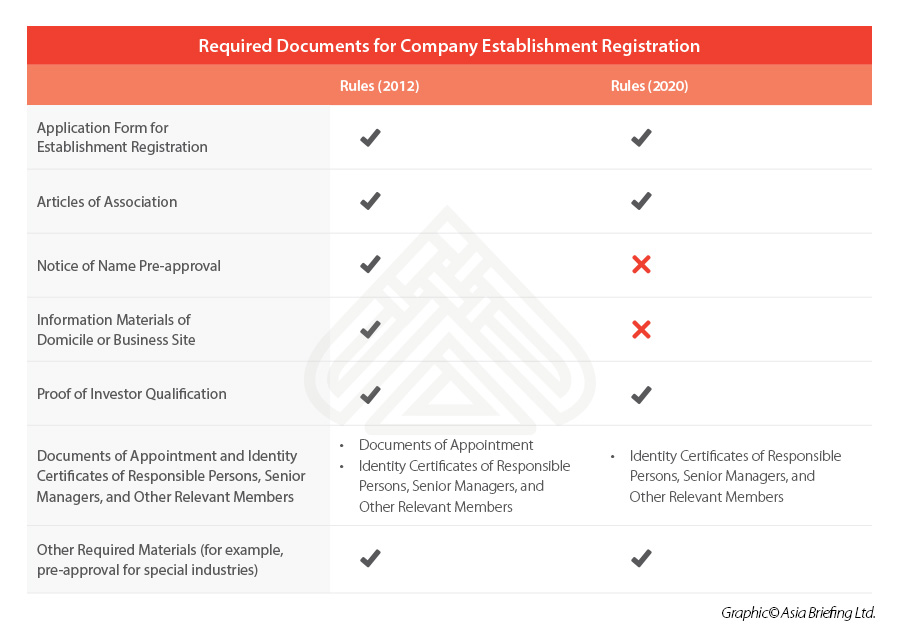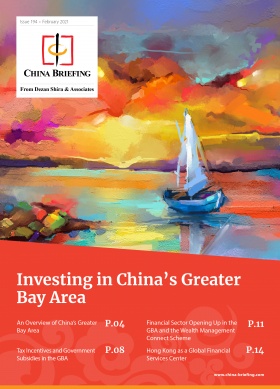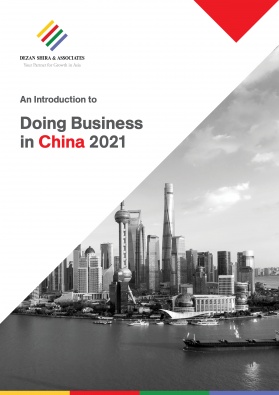Shenzhen Implements New Rules on Commercial Registration, More Friendly to FDI
On March 1, 2021, the new Rules of Shenzhen Special Economic Zone on Commercial Registration (the “Rules”) took effect. The original Rules made in 2012, was lately amended and released on October 29, 2020.
As the first local regulation concerning the commercial registration system in China, the 2012 Rules greatly improved the business environment in Shenzhen by giving clear instructions and enhanced legal certainties. This helped Shenzhen in attracting foreign investment.
Now, with the 14th Five Year Plan being released earlier this year and the Plans for Guangdong-Hong Kong-Macao Greater Bay Area (“GBA”) to build a world-class innovation hub and city cluster, Shenzhen is expected to play a “core role”. The city will be expected to create a more preferential business environment and in this context, Shenzhen’s updated rules on commercial registration worth a closer review.
Who will be subject to the Rules and how?
According to Article 2 of the Rules, commercial registration refers to the activities of the commercial registration authority to register, put on record, and make public the matters concerning the establishment, alteration, and deregistration of commercial entities, within the territory of Shenzhen.
Under the context of the Rules, the “commercial entities” refer to any corporation, partnership, limited partnership, proprietorship, sole proprietorship, company, or individual that performs a commercial activity in its own name to enjoy the rights and obligations in the market, while the “commercial registration authority” normally refers to the Shenzhen Administration of Market Regulation (the Shenzhen AMR).
In plain words, the Rules tell people doing business in Shenzhen what formalities they need to follow and what to prepare if they want to legally participate in the market operation.
Moreover, the Rules make it clear that what kind of matters come under the purview of the registration administration and filling administration, respectively.
The following matters of a commercial entity shall be registered:
- Name;
- Domicile or business premise;
- Type;
- Principal; and
- The investment subject and its subscribed capital contribution amount.
The following matters of a commercial entity shall be subjected to filling administration:
- Articles of association or agreement;
- Scope of business;
- Directors, supervisors, and senior executives; and
- The liaison for commercial registration management
What are the changes introduced?
Establishment documentation simplified
The 2020 Rules have simplified the documentation requirements in company establishment registration.
It no longer requires the applicants to submit “Notice of Name Pre-Approval”, “Information Materials of Domicile or Business Site” and “Documents of Appointment of the Responsible Persons, Senior Managers, and other relevant members”.
Instead, applicants can merely provide this information when they file applications online. Our professional services team experienced the benefits of this convenience when assisting a client wanting to establish a new WFOE in Shenzhen in the middle of March this year.
Comparison between the 2012 Rules and the 2020 Rules are as follows:

Green channel for Hong Kong and Macao investors
In the past, if investors from Hong Kong and Macao wanted to enter the Mainland market and directly participate in business activities, they had to set up foreign invested entities (FIEs) and obtain business licenses in accordance with Chinese foreign investment laws like foreign investors from other countries.
The 2020 Rules provide a green channel for Hong Kong and Macao investors to directly enter the Shenzhen market, for the first time. It specifically allows Hong Kong and Macau investors to directly complete registration formalities (account opening with bank, tax affairs, Customs, foreign exchange account, examination/approval, and other matters) for engaging in manufacturing or business activities in Shenzhen, as long as their activities are not those included in the Negative List (Special Administrative Measures for Foreign Investment Access). Such investors may obtain business licenses with their existing names as used in Hong Kong or Macao without setting up a new commercial entity in Shenzhen according to Art. 14 of the 2020 Rules. This will save a lot of time and cost for setting up and running a new commercial entity.
But for the moment, the 2020 Rules do not specify details about how the Hong Kong and Macao investors directly obtain a business license; such formalities will be subject to the later implementation measures that will be formulated separately by the Shenzhen government although there is no clear timeline on this.
Commercial entities can be “dormant” now
According to the PRC Company Law, if a commercial entity fails to operate for more than six months, its business licenses might be revoked by the AMR. In reality, the situation is not that extreme and strict, yet entities that do not engage in any business activities for a long time may face being recorded in the list of abnormal operators by AMR, with the worst-case scenario being that their business license gets revoked.
Besides the Company Law provisions, commercial entities that temporarily encounter a difficult time, show no profit but have the potential and capacity to resume someday, would still have to wind up their operations or pay daily running costs.
Now, under the 2020 Rule, Shenzhen adopts the option of “discontinuation of business”, which allows the commercial entities with temporary difficulties to go dormant and resume normal operation when possible according to Art. 25 of the 2020 Rules.
Areas where clarity is needed
To be noted, the 2020 Rules do not further interpret the implication of “discontinuation of business”, such as:
- Will any taxes be exempted during the period of discontinuation of business?
- Can such status be regarded as a legal cause to terminate certain commercial or civil relationships?
These questions might be answered by future implementation measures.
One License for multiple branches in the same city
In the past, no matter whether the branch is registered in the same city or not, it must apply for a separate business license for its branches before operating.
Now, according to Art. 15 of the 2020 Rules, if a Shenzhen-incorporated commercial entity establishes additional branches, such commercial entity may merely add the information of the branch(es) into its current business license, rather than apply for a separate business license. This makes the compliance process much simpler.
The possibility of a virtual address
Early in December 2010, Shenzhen piloted a virtual address service system in the Qianhai Free Trade Zone (FTZ). Commercial entities registered in Qianhai could enjoy the virtual address service provided by the Qianhai Business Secretary Company.
But, in practice, commercial entities using Qianhai virtual addresses still have had to show another “actual address” for various reasons – mainly for better supervision by the AMR regarding the commercial entity’s compliance.
Art. 16 of The 2020 Rules expands the scope of the application of the service from the Qianhai FTZ to the entire Shenzhen area. Also, virtual address services are expanded from the Qianhai Business Secretary Company to qualified commercial secretary enterprise, accounting firm, law firm, or any other entity with domicile custody. Virtual address services can be provided to commercial entities that engage in e-commerce, consulting, planning, and other business activities that do not need a fixed domicile or business site to operate.
Areas where clarity is needed
For clarity and more information on who is eligible to be qualified service providers and what are the formalities of engaging the virtual address service, we should wait for later implementation measures.
Conclusion
To recap, the 2020 Rules will further enhance Shenzhen’s unique role in the GBA, making Shenzhen more attractive to foreign investors.
The Rules indicate some positive trends in the improvement of the business environment.
Nevertheless, foreign investors are suggested to wait for the release of supporting measures and monitor how the Rules are being implemented in Shenzhen.
About Us
China Briefing is written and produced by Dezan Shira & Associates. The practice assists foreign investors into China and has done so since 1992 through offices in Beijing, Tianjin, Dalian, Qingdao, Shanghai, Hangzhou, Ningbo, Suzhou, Guangzhou, Dongguan, Zhongshan, Shenzhen, and Hong Kong. Please contact the firm for assistance in China at china@dezshira.com.
Dezan Shira & Associates has offices in Vietnam, Indonesia, Singapore, United States, Germany, Italy, India, and Russia, in addition to our trade research facilities along the Belt & Road Initiative. We also have partner firms assisting foreign investors in The Philippines, Malaysia, Thailand, Bangladesh.
- Previous Article China’s Travel Restrictions due to COVID-19: An Explainer
- Next Article Optimizing Profit in a Dividend Repatriation by DTA: A Case Study







